Hearing loss affects how you experience the world around you, impacting your ability to perceive a range of sounds. The effects of hearing loss vary depending on its severity, and nearly 15% of American adults report some trouble hearing. Understanding these stages can help you grasp what might be missed and why seeking treatment is important.
Understanding Mild Hearing Loss

In the early stages of hearing loss, you might notice subtle shifts in your hearing. This phase is marked by difficulty picking up high-frequency sounds, which are crucial for distinguishing certain speech elements and everyday noises.
Here’s what you might miss:
- Speech clarity: High-pitched consonants like “s” and “f” may become less distinct, making conversations harder to follow.
- Nature sounds: The soft, high notes of birds chirping or running water might not be as noticeable.
During this stage, you might find yourself frequently asking people to repeat themselves or struggling in noisy environments.
Understanding Moderate Hearing Loss
As hearing loss progresses to a moderate level, its impact on your auditory perception becomes more significant. This stage involves difficulties with both high and mid-range frequencies, making it harder to hear a variety of sounds.
Sounds commonly missed include:
- Group conversations: Following speech in group settings or crowded places like OBC Kitchen can be challenging.
- Baby crying: The sounds of a baby crying may not be detectable.
- Office noise: The sound of phones ringing or copiers running may be unable to be heard, along with background chatter.
Individuals with moderate hearing loss may rely more on visual clues and experience communication barriers in different social situations.
Understanding Severe Hearing Loss
Severe hearing loss affects a broad range of sounds, including many lower and mid-range frequencies. This stage often requires the use of hearing aids or other amplification devices to aid in communication.
Here’s what becomes more difficult to hear:
- Media: Understanding TV and radio programs can be problematic without amplification.
- Traffic sounds: Important environmental noises like car horns or sirens may be missed, impacting your awareness.
- Children’s voices: The higher pitches of children’s voices can be particularly hard to hear clearly.
For those with severe hearing loss, communication often becomes heavily reliant on visual support or amplification.
Dealing with Profound Hearing Loss
Profound hearing loss represents a severe reduction in auditory perception, where almost all sounds are significantly affected. Even with hearing aids or cochlear implants, many sounds may remain difficult to perceive.
Sounds that are commonly missed include:
- Emergency sirens: Important sounds like fire trucks or other emergency signals might not be heard.
- Natural sounds: The subtle noises of nature, such as rustling leaves or rainfall, may be completely inaudible.
- Voice recognition: Understanding spoken words, especially in noisy environments, can be extremely challenging.
Individuals with profound hearing loss often depend on visual communication methods, such as lip reading or sign language, and face considerable obstacles in daily life.
Hearing loss affects various stages and the range of sounds you miss can have a significant impact on your life. Recognizing what you might be missing underscores the importance of addressing hearing loss and seeking appropriate solutions.
If you suspect that you or your loved one has hearing loss, consult a hearing specialist today. Contact The Hearing & Speech Center to schedule a hearing evaluation.